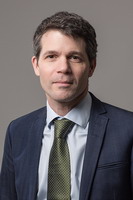Eric Usher, Head, UNEP Finance Initiative

Tell us about yourself and how your organization plays a leadership role in the impact investing space.
I have been the Head of UNEP FI for two years. Prior to this, I spent twenty-five years in the sustainable energy and finance sectors. I’ve developed new approaches to public private partnerships and contributed to the United Nation’s efforts by helping the UNFCCC initiate the Green Climate Fund’s private sector facing efforts. I am Canadian by birth, have lived across the globe and studied at INSEAD.
UNEP FI is a part of UN Environment and has been around for twenty-five years. We’ve built a deep expertise of collaboration with the financial sector to incubate new solutions for sustainable finance. For example, together with the UN Global Compact, we were behind the 2006 launch of the Principles for Responsible Investment. I’d also mention our groundbreaking report on fiduciary duty and ESG with Freshfields Bruckhaus Derringer.
About a year ago we launched the Positive Impact Finance initiative. It’s our answer to the significant funding and solutions gap which the private sector is called on to fill to achieve the Sustainable Development Goals. Their annual price tag has been set at $2.5 trillion. Africa alone represents an annual $1.3 trillion, with a 90% funding gap that could be met by private economic actors.
What challenges do you see for the future of purpose-driven finance?
We have been hearing for decades about the need for a clearer articulation of business drivers for sustainable and impact finance. Often, what we hear is conceptual – for example saying that sustainable business is better business, or macro in nature – for example saying that clean technologies are the future of energy.
We believe the Sustainable Development Goals require us to deepen our thinking about business drivers. With Positive Impact Finance, we are working with partners to look at impact at the strategic level and make explicit the concrete impact value creators behind the businesses and solutions that can solve the SDG-gaps.
In fact, probably by virtue of where we and other sustainable finance initiatives sit and the evolution of the field, our focus has often been on doing no harm and managing risks. But we think that SDG-gaps are first and foremost business gaps, because in many countries, the infrastructure that could help deliver social and environmental outcomes, from education to mobility via environmental benefits, simply doesn’t exist. For this to happen, a new set of business and financing need to emerge at the same time.
We’re exploring this with a variety of actors in the value chain. Banks and investors on the financing side. But also, corporates and the public sector, which more often than not remains tasked with providing essential services such as energy, mobility, healthcare or education to citizens, through public planning and tendering. With the finance sector, we’re developing a holistic, impact-based approach to commercial products and services. With the public sector, we’re focusing on tendering that is centered on desired outcomes (say education, employment and economic growth) rather than infrastructure (say schools).
Ultimately, there are significant social, environmental and technological disruptions and transitions under way in our economies. In that context, the SDGs help private and public actors focus on connecting economic solutions with desirable social and environmental outcomes. We’re doing our part to help a new market for impact-based solutions emerge.
What will you be discussing at The Economist's Impact Investing event in New York on February 15?
At the conference, I will engage the audience on core components of our PI initiative. We have a Manifesto that’s basically a declaration of intent, setting out the vision for impact-based business and finance. Together with our finance partners, we also built a set of Principles that focus on the finance supply side of the equation. In 2018, we will be clarifying how different financing solutions, debt, equity or notes, can implement a Positive Impact approach, using real life examples and case studies, and we’ll be developing related guidance notes. We are exploring impact-based tendering through concrete partnerships with municipalities. A new research paper will provide deeper insights into the solutions we propose. I will tell you all about this.